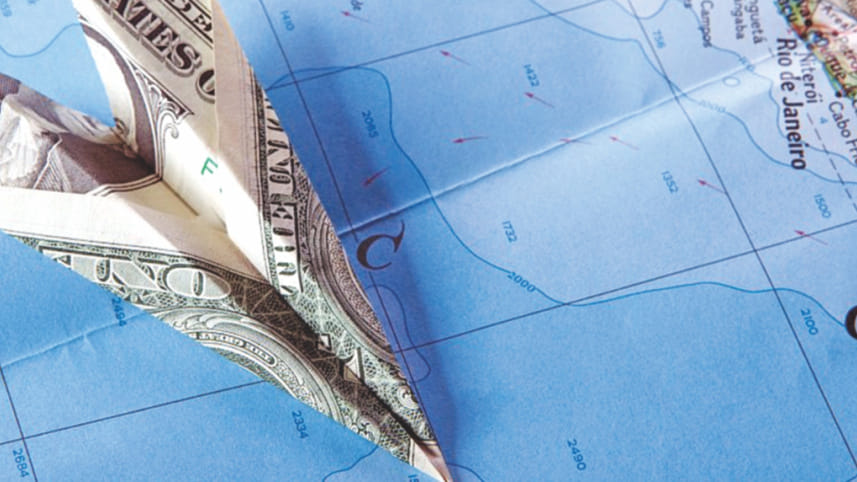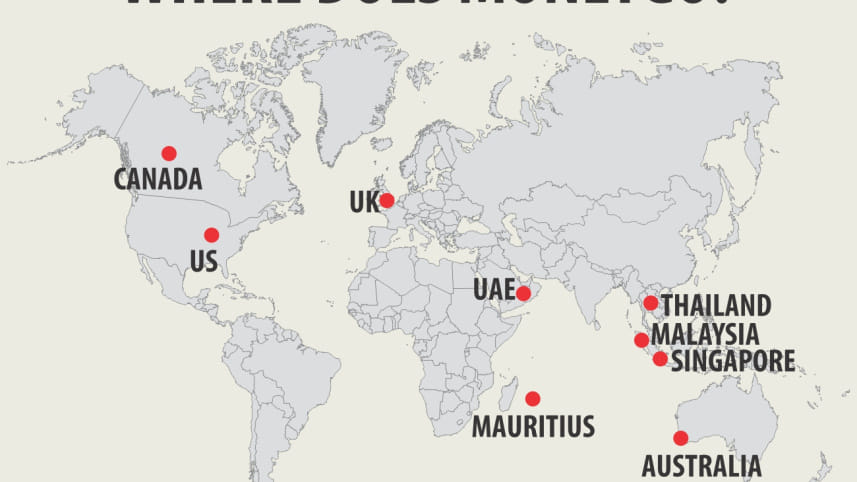Keeping money at home —not that easy

No country in the world can keep all its money at home—not even the otherwise heavenly abodes like the United States. Money flows, whether legally or in illicit ways, across the boundaries. Money avoids war and conflicts, also evades paying taxes. From the high tax rate countries money flows to low tax rate territories or countries. Small and undeveloped countries find it harder to keep all their money at home, as the citizenry in these countries feel insecure with their money. Rich men of the poor countries are global citizens—they hold more than one country's citizenship. They earn money in one country and spend in another country; they send their wards abroad or any safe haven for security reasons and for higher education. As more and more people, especially from the least developed countries like Bangladesh, become global, their money will also become global, meaning money will flow where the citizen wants them.
When policy makers make loud noise that they will catch the illicit money transferees, they are only crying in vain. No chest beating could have kept the money at home, nor would it in the future, no matter how hard or stringent measures are taken to keep the money at home. Money flows across the boundaries for two reasons: one, for higher rate of return from investment; secondly, for security reasons. Money needs safe havens, and a sense of belonging to safe havens is also felt by the money owners themselves.
Bangladesh has to improve its security related indicators if it wants to keep all its money at home. With security parameters, come the human right parameters, which give security to the money holders.
It was reported, a staggering amount of USD 9.66 billion found its way out illegally from Bangladesh in 2013 alone. Over a period of 10 years, spanning from 2004 to 2013, an unbelievably huge amount of money, amounting to USD 55.87 billion, went out of Bangladesh in illegal ways, and a substantial amount of that money found shelter in the places and counties like Switzerland, British Virgin Island, Dubai and Singapore. Actually money in one country or in one place is now owned by people living in another country. No country in the world could account for exactly how much money it lost to illegal transfer. War-torn countries and territories are losing their money rapidly.
Money and assets are in some sense synonyms. Assets are converted into cash money and cash money is converted into suitable foreign currency, and then taken out either through the banking channel or through Hundi or private channels. Many intermediaries find illegal money transfer as a lucrative business. Traffickers traffic both men and money across the boundaries. Many LDCs maintaining restrictions on the transfer of money abroad. For example, can any Bangladeshi easily transfer, through official channels, the money he has had from the asset sales? As the capital account in the Bangladesh economy is not convertible, transfer of money, be that from property sales or from legal earnings, is not that easy to be transferred abroad. But non convertibility of capital account or any other type of restriction could not keep Bangladesh money at home; the owners of money could have taken their money abroad through one way or other bypassing the so-called legal official channels. Corrupt money finds almost wholesale transfer abroad illegally. Till the global system is built be accountable, requiring answers to questions such as where the money is coming from, the illicit transfer of money will continue to take place across boundaries.

A global agreement is needed to stop this type of money transfer. In Bangladesh, a huge amount of money gets transferred to some people through corrupt practices. The money earned through corruption, no matter what incentive is given for their use at home, finds it safe to go aboard. The size of the economy and also the level of the economy in terms of development, are also related to how much money gets to flow aboard illegally from a country.
Had Bangladesh become a member of a big trade block like the TPP, illicit money transfer would have been on a much lower scale. Small and isolated economies fail miserably to give their citizen a sense of feeling secure at home. In these countries, the rates of return on investments are high, but security level is low. When social strife and localised conflicts are added to the small size of the economy, then it becomes almost impossible to keep money.
By putting restrictions, money cannot be kept at home. Rather, restrictions act as a fear factor, which drives the money out of the country. Bangladesh should do two things to keep its money at home, or at least to slow down the pace of illicit transfer: one, Bangladesh should become a member of a big free trade block, or become at least an associate member in the free trade block like ASEAN. Movements of men and money freely among SAARC nations can also be seen as an alternative. Secondly, Bangladesh is to put behind its acrimonious politics in order to keep peace at home. An inclusive politics will help Bangladesh in keeping its money at home. That will also provide security to the rich people who currently have the most to gain from transferring Bangladesh money abroad illegally.
The writer is a Professor of Economics of the University of Dhaka. He can be contacted at abuahmedecon@yahoo.com



 For all latest news, follow The Daily Star's Google News channel.
For all latest news, follow The Daily Star's Google News channel.
Comments